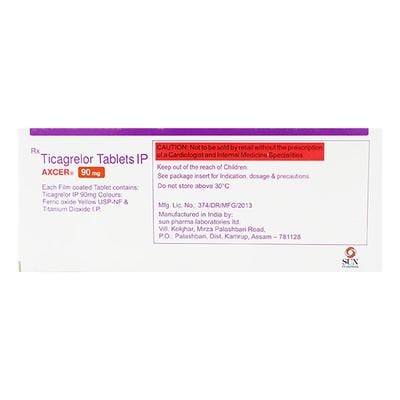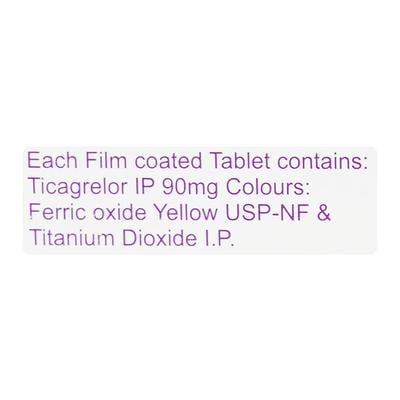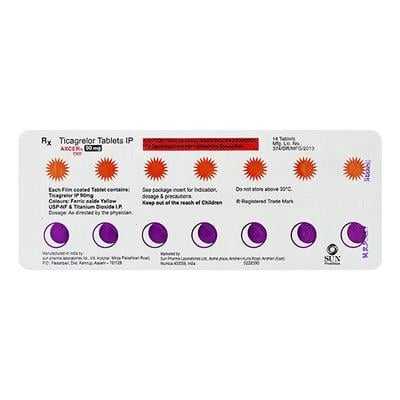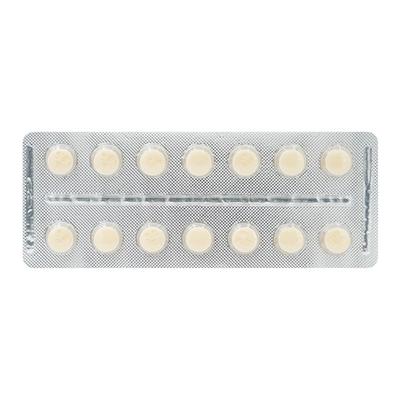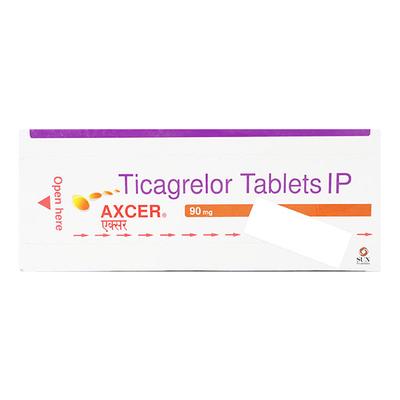

Netmeds First Membership
Quick Links
Introduction About AXCER 90MG TABLET
Axcer 90 mg Tablet contains Ticagrelor, a medicine that supports healthy blood circulation by helping to reduce the risk of clot formation in certain heart conditions. It is commonly recommended for individuals who have had a recent heart-related event, such as an episode of chest discomfort (angina) or certain types of heart attack, as part of ongoing cardiac care. Its mechanism works by making platelets in the blood less likely to stick together, ensuring smoother blood flow through the vessels.
This tablet may be suggested for adults with a history of acute coronary syndrome or those who have undergone stent placement. It is generally used in combination with low-dose aspirin for enhanced cardiovascular protection. People who have risk factors like high blood pressure, diabetes, smoking history, or high cholesterol may be advised this medicine as part of a prescribed cardiac care plan. The suitability depends on individual medical history, which should be assessed by a qualified healthcare professional.
Axcer 90 mg is usually taken orally, with or without food, at the same time every day, as directed by your doctor. It is important to follow the prescribed dosage and not to stop suddenly without medical advice, as this could impact heart health. Swallow the tablet whole with water and avoid doubling doses if one is missed. Patients should inform their healthcare provider about all other medicines, supplements, or herbal products they are using to avoid unwanted interactions.
People with a history of bleeding disorders, recent surgery, liver impairment, or certain heart rhythm problems should discuss these conditions before starting Axcer 90 mg. It is generally not recommended during pregnancy or breastfeeding unless specifically advised by a doctor. Common side effects may include shortness of breath, dizziness, headaches, or mild bleeding (such as nosebleeds or easy bruising). Any unusual or persistent symptoms should be reported promptly to a healthcare professional.
Uses Of AXCER 90MG TABLET
- Acute Coronary Syndrome (ACS)
- Myocardial Infarction (MI)
- Helps reduce the risk of cardiovascular death, heart attack and stroke
Benefits of AXCER 90MG TABLET
Axcer 90mg for Blood Clot Prevention
Axcer 90mg Tablet contains Ticagrelor, an antiplatelet medicine that helps prevent the formation of harmful blood clots in the blood vessels. It works by stopping platelets (a type of blood cell) from sticking together, reducing the risk of clots that may lead to serious heart complications. Axcer is especially helpful in people with a history of heart attack, stent placement, or other cardiovascular events. It is usually prescribed alongside low-dose aspirin to enhance its antiplatelet effect. Regular use as advised by your doctor can support better blood flow and lower the chances of clot-related emergencies.
Axcer 90mg for Acute Coronary Syndrome
In cases of Acute Coronary Syndrome (ACS) which includes conditions like heart attack or unstable angina, Axcer 90mg is commonly prescribed to improve outcomes and prevent further complications. It acts quickly to block platelet activity, reducing the risk of new clots forming in narrowed or damaged arteries. Axcer is often used during or after procedures like angioplasty or stent placement to support heart recovery and maintain artery openness. It may be started in the hospital and continued long-term under supervision. Patients should follow the dosage carefully and report any unusual bleeding or breathing difficulty while on the medicine.
How AXCER 90MG TABLET Works
Axcer 90mg – Mechanism of Action
Axcer 90mg contains Ticagrelor, a P2Y12 receptor antagonist that works by inhibiting platelet aggregation. Platelets are blood cells that help form clots to stop bleeding, but in heart conditions, they can clump together unnecessarily and block arteries. Ticagrelor selectively and reversibly binds to P2Y12 receptors on platelets, preventing them from getting activated by ADP (adenosine diphosphate), a natural clot-promoting substance. By stopping this activation, Axcer reduces the risk of harmful blood clot formation without permanently disabling platelets, which sets it apart from some older antiplatelet drugs.
How Axcer 90mg Works to Support Blood Circulation
Axcer 90mg helps maintain smooth blood flow by keeping platelets from clumping together and forming clots in the blood vessels. In people with narrowed or damaged arteries especially after events like a heart attack or stent placement this action is crucial to prevent re-blockage and support recovery. By reducing clot formation, Axcer keeps the blood vessels open, improving oxygen and nutrient delivery to the heart and other organs. This improved circulation can reduce chest discomfort, support healing, and lower the risk of future heart-related complications when taken regularly as advised by your doctor.
How to use AXCER 90MG TABLET
How to Take Axcer 90mg Tablet
- Take Axcer 90mg exactly as prescribed by your doctor.
- It is usually taken twice a day, approximately 12 hours apart.
- Swallow the tablet whole with a glass of water; do not crush or chew it.
- Try to take it at the same time every day to maintain consistent levels in your body.
- Do not stop taking Axcer suddenly without medical advice, as this may increase the risk of heart-related events.
- If you miss a dose, take it as soon as you remember. If it’s almost time for your next dose, skip the missed one do not double dose.
Can Axcer 90mg Be Taken with or without food?
- Yes, Axcer 90mg can be taken with or without food.
- Food does not significantly affect how the medicine works.
- You can take it based on your comfort or routine.
- To reduce stomach discomfort, especially if you're also taking aspirin, it may be better to take it after meals.
- Always take the tablet with a full glass of water.
- Try to take it at the same time every day for best results.
Axcer 90mg Dosage Instructions
- The standard recommended dose of Axcer is 90mg twice daily, usually continued for up to 12 months after a heart-related event or stent placement.
- After this period, your doctor may adjust, reduce, or stop the dose based on your individual health status.
- Axcer is often prescribed along with low-dose aspirin (75–100mg daily) as part of dual antiplatelet therapy (DAPT).
- Dosage may vary depending on your medical condition, age, liver function, and bleeding risk do not change the dose on your own.
- Always follow your doctor's advice and attend regular follow-up visits for dose evaluation and safety monitoring.
What if I forgot to take AXCER 90MG TABLET
- Take the missed dose as soon as you remember, unless it’s almost time for your next dose.
- If it's close to the next scheduled dose, skip the missed dose and continue with your regular dosing schedule.
- Do not take two doses at the same time to make up for a missed one.
- Missing a dose may reduce the medicine’s effectiveness in preventing blood clots.
- Try to take your doses at the same time every day to avoid forgetting.
- If you frequently miss doses, talk to your doctor or pharmacist for tips on staying consistent.
Overdose
If you or anyone else accidentally took more Axcer 90mg Tablet, consult your doctor immediately or visit the nearest hospital. Symptoms of overdose may include excessive bleeding, shortness of breath, dizziness, or unusual bruising. Prompt medical attention is essential to manage any potential complications.
Side Effects Of AXCER 90MG TABLET
Common side effects of Axcer 90mg Tablet:
- Shortness of breath
- Bleeding and bruising
- Headache, feeling dizzy
- Diarrhoea, indigestion or constipation
- Nausea
- Skin rash or itching
- Gout (severe pain and swelling in joints)
- Low blood pressure
- Bleeding in the nose, stomach lining or gums
- Bleeding after surgery or from cuts
When to Seek Medical Attention?
Stop taking AXCER 90MG TABLET and contact your doctor immediately if you experience any of the following side effects:
- Signs of stroke (such as headache, feeling dizzy, sudden numbness of arm, leg or face, especially if only on one side of the body, confusion, difficulty in speaking, lack of co-ordination)
- Unexpected bleeding
- Pink, red or brown urine
- Vomiting blood clots
- Red or black stools
- Fainting (syncope)
- Thrombotic Thrombocytopenic Purpura (such as fever and purplish spots on skin or in mouth, with or without yellowing of skin or eyes, unexplained extreme tiredness or confusion)
How To Manage Side Effects
Diarrhea
- Stay Hydrated: Drink plenty of fluids like water, coconut water, clear broths, or oral rehydration solution (ORS) to replace lost fluids and electrolytes.
- Eat a BRAT Diet: Focus on Bananas, Rice, Applesauce and toast, these are easy to digest and help firm up stools.
- Try Salt-Sugar Solution: Mix 1 litre of clean water with 6 teaspoons of sugar and ½ teaspoon of salt to prevent dehydration (homemade ORS).
- Rest Your Digestive System: Avoid heavy, oily, or spicy foods. Give your stomach a break by eating light and bland meals.
- Drink Herbal Teas: Ginger or chamomile tea may soothe the gut and reduce cramps.
- Avoid Dairy and Caffeine: These can worsen symptoms during diarrhoea and irritate the digestive tract.
Skin rash Or Itching
- Cold Compress: Apply a cool, damp cloth or an ice pack wrapped in a towel to the itchy area for 10–15 minutes to reduce inflammation and soothe the skin.
- Oatmeal Bath: Add colloidal oatmeal (finely ground oats) to lukewarm bathwater and soak for 15–20 minutes. It helps relieve itching due to dryness, rashes, or irritation.
- Apply Coconut Oil: Use virgin coconut oil on dry or irritated skin. It has moisturizing and anti-inflammatory properties.
- Use Aloe Vera Gel: Apply fresh aloe vera gel directly on the itchy area. It's soothing and helps reduce redness or inflammation.
- Moisturize Regularly: Apply unscented, hypoallergenic moisturizers (like petroleum jelly or shea butter) to keep the skin hydrated.
- Baking Soda Paste: Mix baking soda with a little water to form a paste and apply it to the itchy area. Leave on for 10–15 minutes before rinsing off.
Warning & Precautions
Pregnancy
Monitoring requiredAxcer 90mg Tablet is generally not advised during pregnancy unless clearly needed. Always discuss potential risks and benefits with your doctor before use.
Breastfeeding
Monitoring requiredUse of Axcer 90mg Tablet during breastfeeding is not usually recommended. Speak with your doctor to understand the possible risks and benefits.
Driving and Using Machines
Use with CautionAvoid driving or operating heavy machinery if you feel dizzy, light-headed, or otherwise unwell while taking this medicine.
Alcohol
ContraindicatedIt is best to avoid drinking alcohol while taking Axcer 90mg Tablet. Consult your doctor for personalized advice.
Liver
ContraindicatedDo not take Axcer 90mg Tablet if you have severe liver problems. Talk to your doctor for suitable alternatives.
Allergy
ContraindicatedAvoid this medicine if you are allergic to Ticagrelor or any of its ingredients.
Lungs
Use with CautionIf you have asthma, breathing difficulties, or other lung conditions, take Axcer 90mg Tablet only under medical supervision.
Heart Disease
Use with CautionPatients with irregular heart rhythms or heart-related conditions should use this medicine carefully and follow their doctor’s advice.
Other Warnings for AXCER 90MG TABLET
Before taking this Talk to your doctor before taking this medicine, if you:
- have a recent serious injury, recent surgery, recent bleeding from your stomach or gut or any other bleeding disorders
- suffer from hyperuricemia (increased uric acid levels in blood)
Safety Advice
- Inform About All Medicines You Take
Share a full list of prescription, over-the-counter, and herbal medicines with your doctor to avoid interactions. - Check for Upcoming Vaccinations
Inform your doctor if you are due for any vaccines as some may require precautions while on blood-thinning medicines. - Monitor for Unusual Symptoms
Report black stools, blood in urine, or coughing blood immediately, as these could indicate internal bleeding. - Be Cautious with High-Risk Activities
Use protective gear while gardening, cooking, or doing home repairs to reduce injury risk. - Travel Preparedness
Carry a medical information card mentioning that you are on Ticagrelor to inform emergency healthcare providers during travel. - Avoid Abrupt Discontinuation
Never stop taking Axcer 90mg suddenly without medical advice, as it may increase heart-related risks. - Stay Alert During Hot Weather
High heat or dehydration can increase dizziness or fatigue, so drink adequate water unless otherwise advised by your doctor. - Inform Before New Prescriptions
Remind your healthcare providers, including dentists, that you are taking Axcer 90mg before starting any new medicine.
Diet and Lifestyle Advice
- Follow a Heart-Healthy Diet: Include fruits, vegetables, whole grains, and lean proteins to support cardiovascular health. Limit saturated fats, fried foods, and processed snacks to reduce strain on your heart.
- Reduce Salt Intake: Minimize excessive salt and salty packaged foods to maintain healthy blood pressure levels.
- Stay Hydrated: Drink sufficient water throughout the day, unless otherwise restricted by your doctor.
- Quit Smoking: Smoking increases strain on the heart and blood vessels. Seek medical support to quit for better outcomes.
- Regular Physical Activity: Engage in moderate exercise like walking, yoga, or cycling, as recommended by your doctor. Avoid strenuous activities or contact sports that can increase injury and bleeding risk.
- Maintain a Healthy Weight: Work towards a balanced weight to support overall heart health and reduce cardiovascular strain.
- Avoid Self-Medication: Do not take over-the-counter painkillers or herbal supplements without consulting your doctor, as they may interact with Axcer 90mg
- Regular Health Check-ups: Schedule periodic blood pressure, heart rate, and blood test monitoring for safe and effective therapy.
- Stress Management: Practice stress-relief techniques like deep breathing, meditation, or light stretching to support overall heart wellness.
1. Axcer 90mg vs Clopilet A in the context of post-angioplasty care:
|
Feature |
Axcer 90mg Tablet |
Clopilet A Tablet |
|
Active Ingredient |
Ticagrelor 90 mg |
Clopidogrel + Aspirin |
|
Drug Class |
P2Y12 receptor antagonist (reversible) |
Antiplatelet + NSAID combo |
|
Onset of Action |
Rapid (within 30 minutes) |
Slower onset (2–4 hours) |
|
Effectiveness in Post-PCI |
Shown to reduce cardiovascular events post-PCI |
Effective, but slightly less potent than Ticagrelor |
|
Bleeding Risk |
Higher bleeding potential |
Moderate bleeding risk |
|
Dosing Frequency |
Twice daily |
Once daily |
|
Monitoring Needs |
Requires close monitoring for bleeding, dyspnea |
Routine monitoring sufficient |
|
Ideal for |
Patients needing faster platelet inhibition post-angioplasty |
Patients with low bleeding risk and cost concerns |
|
Cost |
Higher |
More affordable |
2. Axcer 90mg Tablet vs Ecosprin AV in the context of managing heart-related conditions:
|
Feature |
Axcer 90mg Tablet |
Ecosprin AV Tablet |
|
Active Ingredient |
Ticagrelor 90 mg |
Aspirin + Atorvastatin |
|
Drug Class |
Antiplatelet (P2Y12 receptor antagonist) |
Antiplatelet (Aspirin) + Statin (Atorvastatin) |
|
Primary Action |
Prevents platelet aggregation |
Reduces clot formation and cholesterol levels |
|
Use in Heart Conditions |
Preferred for acute coronary syndrome, post-PCI |
Used for long-term cardiovascular risk management |
|
Onset of Action |
Rapid (within 30 minutes) |
Aspirin acts fast; statin effects seen over weeks |
|
Bleeding Risk |
Higher (especially gastrointestinal or nasal) |
Moderate bleeding risk (due to aspirin) |
|
Lipid Control |
No effect on cholesterol |
Helps lower LDL and triglycerides |
|
Dosing Frequency |
Twice daily |
Once daily |
|
Monitoring Needs |
Requires close monitoring for dyspnea, bleeding |
Periodic lipid profile, liver function tests |
|
Ideal for |
Short-term post-stent care, high clot risk patients |
Long-term heart risk reduction, cholesterol control |
3. Axcer 90mg Tablet vs Prasugrel 10mg Tablet regarding their antiplatelet support:
|
Feature |
Axcer 90mg Tablet |
Prasugrel 10mg Tablet |
|
Active Ingredient |
Ticagrelor |
Prasugrel |
|
Drug Class |
P2Y12 receptor antagonist (reversible) |
P2Y12 receptor antagonist (irreversible) |
|
Onset of Action |
Rapid (within 30 minutes) |
Rapid (within 30 minutes) |
|
Binding to Platelets |
Reversible |
Irreversible |
|
Duration of Action |
Shorter (requires twice-daily dosing) |
Longer (once daily dosing) |
|
Efficacy in ACS |
Shown to reduce CV events, preferred in many ACS guidelines |
Effective, but may be slightly less potent in high-risk ACS |
|
Bleeding Risk |
Higher, especially non-CABG related |
Higher, especially in patients >75 years or <60 kg |
|
Dosing Frequency |
Twice daily |
Once daily |
|
Contraindications |
History of bleeding, liver impairment |
Prior stroke/TIA, elderly, underweight patients |
|
Monitoring Needs |
Regular monitoring for bleeding and dyspnea |
Monitor bleeding risk and patient weight/age |
Drug - Drug interaction
1. Aspirin (Acetylsalicylic Acid)
- Interaction: When taken together with Axcer, the risk of bleeding may increase.
- Management: Use the combination only under medical supervision. Usually, a low dose of aspirin (75–100 mg) is recommended along with Axcer.
2. Other Antiplatelet or Anticoagulant Drugs (e.g., Clopidogrel, Prasugrel, Warfarin, Dabigatran, Rivaroxaban)
- Interaction: Using more than one blood thinner increases the bleeding risk significantly.
- Management: Combination may be necessary in some heart conditions but should be closely monitored. Watch for unusual bruising, gum bleeding, or black stools.
3. CYP3A4 Inhibitors (e.g., Ketoconazole, Clarithromycin, Ritonavir)
- Interaction: These medicines may increase ticagrelor levels in the blood, raising side effect risks.
- Management: Avoid using strong CYP3A4 inhibitors with Axcer. If unavoidable, dosage adjustment or alternative therapy may be needed.
4. CYP3A4 Inducers (e.g., Rifampicin, Carbamazepine, Phenytoin)
- Interaction: These may reduce ticagrelor effectiveness by lowering its blood levels.
- Management: Avoid combining with Axcer. Your doctor may consider another antiplatelet option.
5. Digoxin
- Interaction: Axcer can increase digoxin blood levels, which may lead to toxicity.
- Management: Monitor digoxin levels periodically if taken together. Report symptoms like nausea, vision changes, or irregular heartbeat.
6. Statins (e.g., Simvastatin, Lovastatin)
- Interaction: High doses (especially >40 mg) can increase the risk of muscle damage (myopathy/rhabdomyolysis).
- Management: Use lower statin doses (≤40 mg) and monitor for muscle pain or weakness.
7. Beta-blockers and Calcium Channel Blockers (e.g., Verapamil, Diltiazem)
- Interaction: These may enhance the risk of bradycardia (slow heart rate) when used with Axcer.
- Management: Caution is advised. Regular heart rate monitoring may be needed.
8. NSAIDs (e.g., Ibuprofen, Naproxen)
- Interaction: May increase the risk of stomach or intestinal bleeding.
- Management: Use the lowest effective NSAID dose for the shortest time. Consider alternatives like paracetamol if suitable.
9. SSRIs and SNRIs (e.g., Sertraline, Fluoxetine, Duloxetine)
- Interaction: May enhance bleeding risk due to effects on platelets.
- Management: Monitor for any signs of bleeding. Inform your doctor if you notice prolonged bleeding or bruising.
10. Herbal Supplements (e.g., Ginkgo biloba, Garlic, Ginger, Turmeric)
- Interaction: These herbs may increase bleeding risk when taken with Axcer due to their natural blood-thinning effects.
- Management: Avoid or limit these supplements. Always inform your doctor about any herbal or traditional remedies you're using.
Drug - Food interaction
1. Grapefruit or Grapefruit Juice
- Interaction: Grapefruit inhibits the CYP3A4 enzyme in the liver, which can increase ticagrelor levels in the blood and raise the risk of side effects like shortness of breath or bleeding.
- Management: Avoid grapefruit and grapefruit juice while taking Axcer.
2. Caffeine (e.g., tea, coffee, energy drinks)
- Interaction: While caffeine doesn’t directly interact with Axcer, excessive caffeine may increase heart rate or cause palpitations, which can be concerning if you're already at risk for heart rhythm issues.
- Management: Keep caffeine intake moderate and monitor for symptoms like rapid heartbeat or restlessness.
3. High-Fat Meals
- Interaction: Ticagrelor can be taken with or without food. High-fat meals don’t significantly alter its absorption, but a consistent meal pattern may help reduce stomach upset.
- Management: No specific restriction required. Take Axcer with or without food based on your comfort.
4. Foods Rich in Vitamin K (e.g., spinach, broccoli, kale)
- Interaction: These do not directly affect ticagrelor but may interact with other anticoagulants like warfarin if used together.
- Management: If taking only Axcer, no need to restrict Vitamin K foods. Maintain a balanced and consistent diet.
Synopsis
|
Drug |
Ticagrelor |
|
Pharmacological Category |
Antiplatelet agent, P2Y12 receptor antagonist |
|
Therapeutic Indication |
Heart attack and stroke |
|
Dosage Forms |
Tablet |
More Information
Storage
- Keep at room temperature (below 30°C), away from direct heat and sunlight.
- Store the medicine in a secure place out of reach of children and pets.
FAQs About AXCER 90MG TABLET
Q: What is Axcer 90mg Tablet used for?
A: Axcer 90mg Tablet contains Ticagrelor, which helps stop blood clots from forming in your blood vessels. It is commonly used in people with heart problems like heart attacks or angina (chest pain). It helps reduce the chance of serious events like another heart attack, stroke, or death.
Q: Can I take Axcer 90mg Tablet with food?
A: Yes, Axcer 90mg Tablet can be taken with or without food. If it causes stomach upset, taking it with food may help. Always take it with a glass of water.
Q: What are the common side effects of Axcer 90mg Tablet?
A: Some common side effects include bleeding, shortness of breath, bruising, or headache. Most are mild but inform your doctor if they bother you or don’t go away.
Q: Can Axcer 90mg Tablet cause bleeding?
A: Yes, since Axcer 90mg Tablet prevents blood clotting, it may increase your risk of bleeding. This could include nosebleeds, gum bleeding, or easy bruising. Tell your doctor if you notice unusual or heavy bleeding.
Q: Is Axcer 90mg Tablet a blood thinner?
A: Yes, Axcer is considered a blood thinner (antiplatelet medicine). It does not actually thin your blood but makes it harder for platelets to stick together, helping prevent clots.
Q: Is Axcer 90mg Tablet a lifelong medication?
A: Not always, your doctor may prescribe it for a fixed period, such as 12 months after a heart attack, or longer based on your heart condition and risk factors.
Q: What if I vomit after taking Axcer?
A: If you vomit shortly after taking the tablet, do not repeat the dose unless your doctor advises. If vomiting continues, contact your doctor.
Q: Can I take painkillers with Axcer?
A: Avoid painkillers like ibuprofen or aspirin without medical advice. They may increase the risk of bleeding. You can use paracetamol if needed, after confirming with your doctor.
Q: Can Axcer 90mg Tablet be taken before surgery or dental work?
A: You must inform your surgeon or dentist that you are taking Axcer. They may advise you to stop it a few days before the procedure to reduce bleeding risk.
Q: What tests are required while on Axcer 90mg Tablet?
A: Your doctor may check for signs of bleeding, blood counts and liver function during treatment, especially if you're on other medications.
Q: What should I do in case of overdose?
A: In case of overdose, seek emergency medical help immediately. Symptoms may include severe bleeding or difficulty breathing.
References
1. Keith A.A. Fox, Harvey D. White, Bernard J. Gersh and Lionel H. Opie. Antithrombotic Agents: Platelet Inhibitors, Acute Anticoagulants, Fibrinolytics and Chronic Anticoagulants. Drugs for the heart. 8th Edition. 2013. Page-351-352.
2. Gerald G. Briggs, Roger K. Freeman. T. A reference guide to fetal and neonatal risk: Drugs in Pregnancy and Lactation, Tenth Edition. 2015. Page – 3799-3800.
3. Jolanta M Siller-Matula, Bernd Jilma. Ticagrelor: from discovery to Phase III clinical trial. NIH National Library of Medicine, National centre of Biotechnology information. [Revised in November 2010]. [Accessed on 7th August 2025] ![]()
4. Dominick J. Angiolillo, George D. Dengas. Ticagrelor With Aspirin or Alone in High-Risk Patients After Coronary Intervention – TWILIGHT. American college of cardiology. [Revised in 15th February 2022]. [Accessed 7th August 2025] 









